對話 Dialogue
馬可:小實,你拿著黑黑、長長的袋子,那裡面是樂器嗎?
Mǎkè: Xiǎoshí, nǐ názhe hēi hēi, cháng cháng de dàizi, nà lǐmiàn shì yuèqì ma?
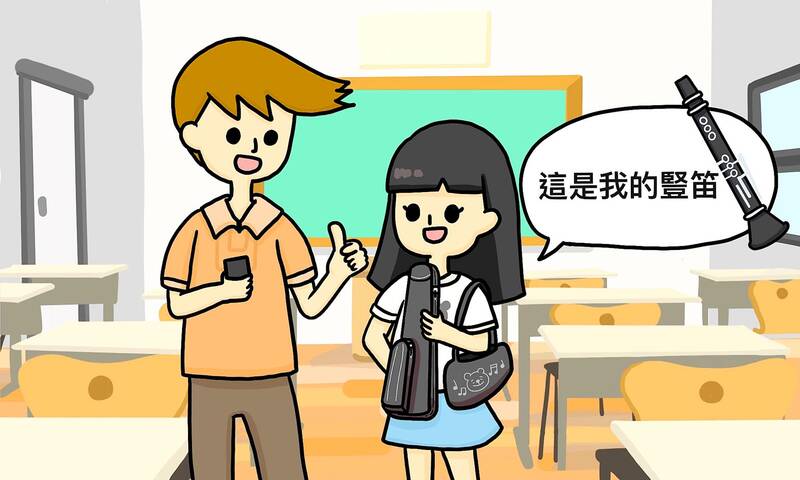
小實:是啊!這是我的豎笛。
Xiǎoshí: Shì a! Zhè shì wǒ de shùdí.
馬克:哇!我不知道你會吹豎笛,你也參加管弦樂團嗎?
Mǎkè: Wa! Wǒ bù zhīdào nǐ huì chuī shùdí, nǐ yě cānjiā guǎnxián yuètuán ma?
小實:對啊!下個月我們有一場音樂會,你要來嗎?
Xiǎoshí: Duì a! Xià ge yuè wǒmen yǒu yì chǎng yīnyuèhuì, nǐ yào lái ma?
馬克:我很喜歡聽音樂,不過我對古典樂不太熟悉,怕聽不懂。
Mǎkè: Wǒ hěn xǐhuān tīng yīnyuè, búguò wǒ duì gǔdiǎnyuè bú tài shóuxī, pà tīng bù dǒng.
小實:沒關係,我想你一定知道「貝多芬」這位作曲家吧?
Xiǎoshí: Méiguānxi, wǒ xiǎng nǐ yídìng zhīdào “Bèiduōfēn” zhè wèi zuòqǔjiā ba?
馬克:貝多芬我知道啊!我還知道音樂神童莫札特。
Mǎkè: Bèiduōfēn wǒ zhīdào a! Wǒ hái zhīdào yīnyuè shéntóng Mòzhátè.
小實:我們下個月要演出貝多芬的「快樂頌」哦。
Xiǎoshí: Wǒmen xià ge yuè yào yǎnchū Bèiduōfēn de “kuàilè sòng” o.
馬克:嗯……我還是去聽我的流行樂吧!
Mǎkè: Ēn… wǒ háishì qù tīng wǒ de liúxíngyuè ba!
翻譯 Translation
Mark: Xiaoshi, you are carrying a black, long bag. Is it a musical instrument in it?
Xiaoshi: Yes! This is my clarinet.
Mark: Wow! I didn’t know you play the clarinet. Do you also play in the orchestra?
Xiaoshi: Yes! We have a concert next month. Do you want to come?
Mark: I do like listening to music, but I’m not familiar with classical music. I’m afraid I won’t understand it.
Xiaoshi: It’s okay, I think you must know the composer “Beethoven”, right?
Mark: I know Beethoven! I also know the musical prodigy Mozart.
Xiaoshi: We will perform Beethoven’s “Ode to Joy” next month.
Mark: Well. . . I’d better go listen to my pop music!
單字片語 Vocabulary
1. 樂器 (yuèqì) musical instrument
2. 豎笛 (shùdí) clarinet
3. 管弦樂團 (guǎnxián yuètuán) orchestra
4. 音樂會 (yīnyuè huì) concert
5. 古典樂 (gǔdiǎn yuè) classical music
6. 熟悉 (shóuxī) to be familiar with
7. 作曲家 (zuòqǔ jiā) composer
8. 流行樂 (liúxíng yuè) pop music
教材音檔 Audio Files
教材影片 Video Files:
https://www.instagram.com/celc.nou_tw/guide/_/17999106352646292/
實踐大學華語中心提供
By Shih Chien University Chinese Language Center: https://chineseusc.com/
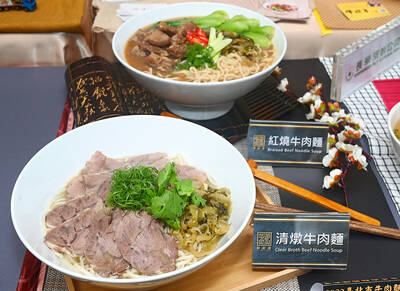
A: In its latest annual travel guide, Bloomberg recommended two restaurants in Taipei: Golden Pig barbeque from South Korea and two-Michelin-star restaurant A. B: Also, tourists should definitely try Taiwanese cuisine while they’re here. Mountain & Sea House, Shin Yeh Taiwanese Cuisine, and Fujin Tree Taiwanese Cuisine & Champagne are good options. A: For local snacks, Fu Hang Soy Milk, Fu-Ba-Wang Pigs’ Knuckles Restaurant, and Wang Ji Rice Dumplings are all very popular. B: And the gold medalists of the 2025 Taipei International Beef Noodle Festival — Yun Shui Kitchen, The Howard Plaza Hotel Taipei, and Come N’ Eat
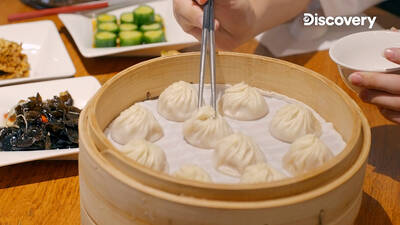
A: Bloomberg just released its annual travel guide, titled “25 Best Places to Travel in 2026.” What were the best Asian destinations? B: There were actually six Asian hotspots: Taiwan’s Taipei, Malaysia’s Penang, Kazakhstan’s Almaty, Indonesia’s Rote Island, India’s Tiger Reserves, and Oman. A: With its mix of traditional food and modern cuisine, Taipei has become a rising food capital in Asia. B: As Bloomberg reported, “Taiwan is a place that bubbles up in culinary conversation because of its famed beverage, bubble tea, and its early adoption of modern night markets.” A: And Din Tai Fung has now
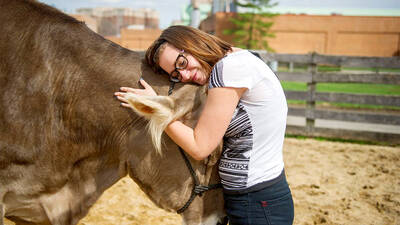
Facing relentless flooding and rising expenses, Dumble Farm in England has stopped selling milk and started an unexpected but therapeutic venture: cow cuddles. In 2022, the owners sold most of their dairy cows and began letting visitors spend time brushing, petting, and even hugging specially trained Highland cows for 95 pounds per session. This unusual shift reflects the rise of the so-called healing economy, a sector where animal-assisted experiences are marketed as emotional remedies for stress and burnout. While dogs and cats remain the most common therapy animals, cows are gaining popularity for their calm nature. At Dumble Farm, only cows that
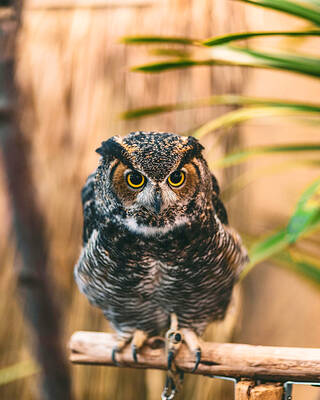
Owls have long fascinated people with their distinctive appearance and mysterious habits. These nocturnal birds possess large, round eyes and a flat facial disc. Their feathers come in shades of brown, gray, or white, helping them blend easily into the darkness. The most remarkable trait of owls is that they can turn their heads without damaging blood vessels. Contrary to popular belief, they can only rotate their heads up to 270 degrees, not 360 degrees. Owls have 14 cervical vertebrae, which is twice as many as humans. This special physical structure compensates for their inability to move their eyes within their